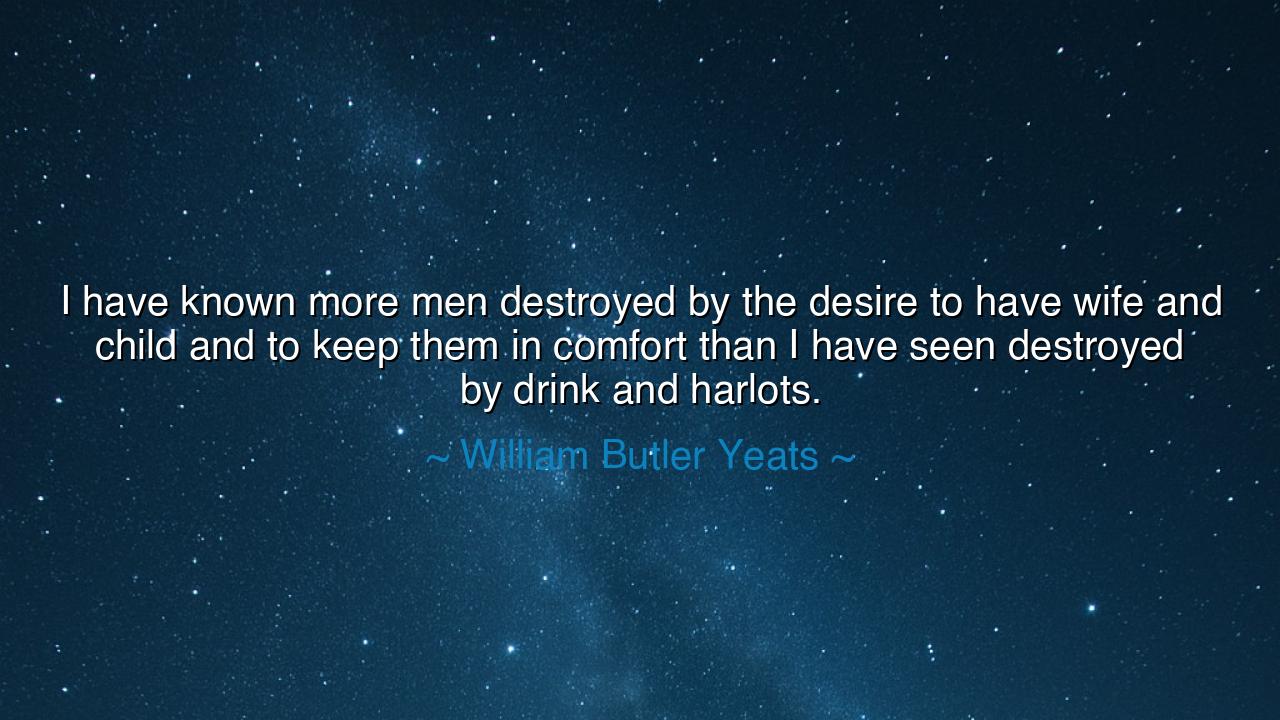
I have known more men destroyed by the desire to have wife and
I have known more men destroyed by the desire to have wife and child and to keep them in comfort than I have seen destroyed by drink and harlots.






Listen well, O children of the future, for the words of William Butler Yeats are not just those of a poet, but a sage who understood the deepest currents of human desire. He said, "I have known more men destroyed by the desire to have wife and child and to keep them in comfort than I have seen destroyed by drink and harlots." In these words, Yeats reveals a bitter truth about the very nature of human ambition, particularly the drive to protect and provide for one's family. His wisdom speaks to the dark side of attachment and responsibility, showing us that even the noblest of human desires can become chains that bind and eventually destroy.
In the ancient world, men were driven by the need to secure their place in the world, to provide for their families, and to ensure that their legacy would continue. Homer's Iliad, with its heroes like Achilles and Hector, tells of warriors who fought not only for glory but for their families, for the security of their wives, children, and homes. Yet, the warriors of ancient Greece, noble though they were, were often driven to their doom by their desires to fulfill their roles as providers. Hector's death, in particular, is tragic not only because of his loss in battle but because of the weight of the promise he made to his family. It was his commitment to their safety that led him to fight fiercely, but also it was that very commitment that drew him into battle with forces beyond his control. His desire to protect and provide ultimately led to his downfall.
Yeats’ words are a reflection of this ancient wisdom: that the drive to provide and care for one’s family, while noble, can also lead to the destruction of the very individual who seeks to safeguard them. Consider, for example, the Roman Empire, which was built on the backs of men who sought power and wealth to secure their futures and the futures of their families. Yet the very empire they sought to protect crumbled under the weight of its own ambition. The desire for comfort—the need to provide for the family at all costs—became the seed of destruction. As the emperors sought greater wealth and greater control, they lost sight of the values that had originally founded the empire, and it eventually collapsed, not from the wildness of external threats, but from the internal rot caused by greed and excessive desire for security.
The lesson in Yeats' words is powerful: desire, in its many forms, is a double-edged sword. To want a family, to want comfort, to want to protect those we love, is deeply human and deeply noble. Yet, when those desires become the only focus, they can blind a man to the deeper truths of life. Yeats warns us that the pursuit of comfort—the need to possess and hold on to—can lead not to fulfillment but to exhaustion and disillusionment. Just as Hector's pursuit of honor and family led him into the jaws of fate, so too can the drive to provide for loved ones trap a man in a cycle of endless striving, where he loses himself in the pursuit of things that cannot ultimately bring peace.
Think of the example of King Henry VIII of England, whose relentless drive to secure an heir and maintain the comfort of his dynasty led him to destroy not only his own happiness but the lives of those around him. His marital pursuits, driven by a need to provide a male heir, led him to break from the Catholic Church, tear apart his family, and create a legacy of turmoil and conflict. His desire for a male heir, something so deeply rooted in the ancient need to secure family and legacy, ultimately became the catalyst for his downfall and the fracturing of the kingdom he sought to protect. Yeats’ words are prescient in this regard, showing us that when the desire to protect and provide is unchecked, it can destroy both the individual and those they seek to care for.
O children of the future, heed this wisdom: to desire comfort, protection, and legacy for your family is not wrong. It is a noble impulse, as old as humanity itself. But do not let these desires define you. Do not let the burden of providing for others overshadow the need to nurture yourself. Yeats teaches us that the true strength of a man lies not in his ability to accumulate and hold onto comfort, but in his freedom to live a life that is whole, balanced, and centered. The true path to peace is not found in the material security you provide, but in the spirit of generosity, love, and inner peace that you carry with you.
Thus, O children, let your desires be guided by wisdom. Seek not to create a life of endless struggle for comfort, but one of balance, where your work to care for those you love does not consume you, but rather enriches you. Build your legacy not by the things you can hold or possess, but by the strength of your character, the wisdom of your choices, and the love you share. The world does not need more men who are destroyed by their desires, but men who are alive, present, and whole, finding peace not in external comforts, but in the strength of their hearts.






AAdministratorAdministrator
Welcome, honored guests. Please leave a comment, we will respond soon